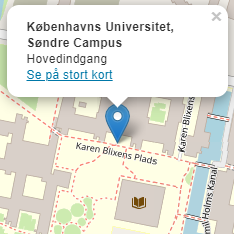Managing Common Ground with epistemics: functional analysis of discourse markers in Upper Napo Kichwa and beyond
Forelæsning af Karolina Grzech, Stockholms Universitet.
Abstract
This talk is concerned with the communicative functions of epistemic discourse markers – expressions associated with the distribution of knowledge between the participants of discourse (e.g. Bergqvist 2012). An example of such an expression from a familiar language is the utterance-initial “but” in English:
- A: Shall we go out for dinner tonight?
- B: But we are going to the cinema with Jane and Jack!
This use of “but” is distinct from its use as a coordinating conjunction. Rather than showing a contrastive relationship between propositions, it serves to indicate that speaker B utters a proposition that (s)he thinks should be known to A, but seems not to be.
Discourse markers which manage the distribution of knowledge have in recent years been described for a substantial number of languages. I will focus on epistemic discourse markers attested in Upper Napo Kichwa (Quechuan, Ecuador). The language has a paradigm of eight epistemic enclitics which can attach to any phrasal category and tend to occur on focal constituents. They are not syntactically obligatory. Rather, their occurrence is motivated by discourse-related factors.
I will present the paradigm and illustrate the epistemic meanings of the Upper Napo Kichwa markers with natural language examples, showing that their semantics is related to epistemic primacy (‘relative right to know’, Stivers et al. 2011). Consequently, I will propose that the markers’ primary function in interaction is the ‘management of Common Ground’, that is, ‘indicating the way Common Ground should develop’ (Krifka 2007). I will show that this analysis accounts for both the markers’ epistemic semantics and their association with focus. Finally, I will propose that the analysis in terms of Common Ground management can be upheld for other languages exhibiting epistemic discourse markers, e.g. for Japanese (e.g. Hayano 2011).
References
Bergqvist, H. 2012. Complex epistemic perspective in Kogi (Arawako-Chibchan). International Journal of American Linguisitics.
Hayano, K. 2011. Claiming epistemic primacy: yo-marked assessments in Japanese. In T. Stivers, L. Mondada & J. Steensig (eds.), The Morality of Knowledge in Conversation, 58–81. Cambridge: CUP.
Krifka, M. 2007. Basic notions of information structure. In C. Féry, G. Fanselow & M. Krifka (eds.), Interdisciplinary Studies on Information Structure (ISIS), vol. 6, 13–56. Potsdam: Universitätsverlag Potsdam.
Stivers, T., L. Mondada & J. Steensig. 2011. Knowledge, morality and affiliation in social interaction. In T. Stivers, L. Mondada & J. Steensig (eds.), The Morality of Knowledge in Conversation, 3–24. Cambridge: CUP.
Om
Karolina Grzech er lingvist og specialist i quechuanske sprog, der tales i det ecuadorianske amazonområde, hvor hun udfører feltarbejde. Hun er ph.d. fra SOAS, London Universitet, og arbejder som postdoc ved Stockholms Universitet. Hendes forskning fokuserer på semantiske og pragmatiske aspekter af evidentiale og epistemisk modale udtryk i naturligt forekommende talt sprog.

